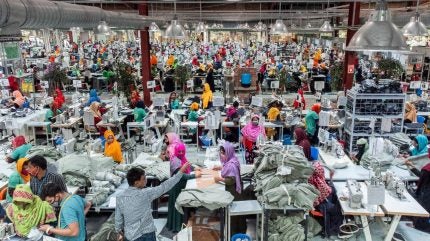
From mid-November 2025, the mechanism will include International Labour Organisation (ILO) Fundamental Principles and Rights At Work and other complaints like wage payments, overtime, employment contracts, severance benefits, and other work-related concerns.
The expansion comes as the Accord signatories and stakeholders acknowledge that the existing Complaints Mechanism cannot process many complaints concerning other work-related matters.

Discover B2B Marketing That Performs
Combine business intelligence and editorial excellence to reach engaged professionals across 36 leading media platforms.
As a result, the signatories agreed to form a unified mechanism that “addresses all workplace-related complaints”, while also complying with the UN Guiding Principles on Business and Human Rights’ criteria for “effective non-judicial grievance mechanisms”.
Implementation of the expanded mechanism will begin in phases, initially involving more than 50 signatory brands and 1,000 factories, before expanding to all covered factories from May 2026.
The International Accord, along with the Ready-Made Garment (RMG) Sustainability Council (RSC) team, signatory brands, and trade unions, will work to maintain the Complaints Mechanism as an accessible and reliable channel for workers.
International Accord executive director Joris Oldenziel said: “The expanded scope of the Complaints Mechanism allows the RSC to address a wider range of workers’ concerns on behalf of Accord signatories. We are encouraged by the trust that workers, factories, signatories, and other stakeholders have placed in the Complaints Mechanism over the years and remain committed, alongside our RSC colleagues, to continue to operate with independence, impartiality, integrity and respect for confidentiality.”

US Tariffs are shifting - will you react or anticipate?
Don’t let policy changes catch you off guard. Stay proactive with real-time data and expert analysis.
By GlobalDataGarment sector backlash
The Bangladesh Garment Manufacturers and Exporters Association (BGMEA), representing garment exporters nationwide, has opposed the announcement. The trade body has instructed its member factories not to take part in any RSC initiatives related to non-OSH complaints mechanisms.
In a letter dated 9 November 2023 sent to its members, BGMEA wrote: “We request all member factories not to respond to any communications, letters, or circulars from the RSC related to the non-OSH complaints mechanism.”
BGMEA, which claims to have approximately 4,500 member factories as per its website, clarified that the issue remains under review. The association’s management continues to have discussions with RSC leadership aimed at clarifying next steps through constructive dialogue, according to The Business Standard.
A final decision is expected after deliberations at an upcoming meeting of the RSC board.
Worker Complaints Mechanism in Bangladesh
The Complaints Mechanism was first introduced through the 2013 Accord on Fire and Building Safety in Bangladesh. Since June 2020, it has been managed by the RMG RSC.
Its operation follows the guidelines set out in the International Accord Framework Agreement and the Bangladesh Safety Agreement.
The Complaints Mechanism has processed more than 4,000 OSH complaints so far, with workers using it to raise issues such as workplace violence, harassment, denial of sick leave, forced overtime, denial of maternity benefits, work-related injuries, and fatalities.
Recently, BGMEA signed a memorandum of understanding (MoU) with the Bangladesh Business and Disability Network (BBDN) to promote inclusive workplaces for persons with disabilities in Bangladesh’s ready-made garment sector.





